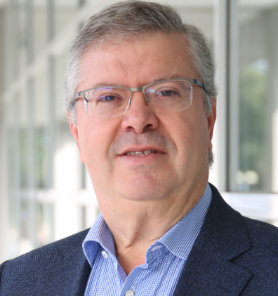

Short Biography
Fernando Silva studied Applied Mathematics at the University of Porto (UP) and in 1987 went to England were he obtained the M.Sc. in Computing at UMIST (1988) and the Ph.D. in Computer Science from the University of Manchester (1993) under the supervision of Prof. Paul Watson. In 2007, obtained the Habilitation in Informatics from the New University of Lisbon. He joined the Department of Applied Mathematics in 1985 and later, in 1996, joined the newly created Computer Science Department, both departments are at the Faculty of Science of the University of Porto (FCUP).
He is a Professor of Computer Science at FCUP, founder and scientific coordinator of the Center for Research in Advanced Computing Systems (CRACS), is a member of MAP-i scientific board, the Doctoral Program in Computer Science of the Universities of Minho, Aveiro and Porto (was Director in 2008/09), is the PI for the Dual PhD Degree in Computer Science between MAPi and Carnegie Mellon University, representing UP, and is Co-Director for Advanced Computing in the UTAustin-Portugal initiative. He was head of the Computer Science Department from 1/2006 till 12/2007.
His primary research interests are in logic programming, programming languages, parallel and distributed computing, middleware and peer-to-peer systems, algorithms for motif discovery in complex networks, and applications in information mining. He has advised 9 completed PhD theses in these areas. He has been involved in several competitively funded projects, and currently leads SIBILA (Towards Smart Interacting Blocks that Improve Learned Advice), and Authenticus (Author name Identification).
He has been invited for scientific committees of several workshops and conferences, was the general chair of the 23rd International Conference on Logic Programming (ICLP'2007), program chair for the 2nd Iberian Grid Infrastructure Conference (IBERGRID'2008) and is general and program chair of the 20th International European Conference on Parallel Processing (Euro-Par'2014). He belongs to the editorial board of the Journal of Universal Computer Science. In total, he has co-authored over 120 research publications.